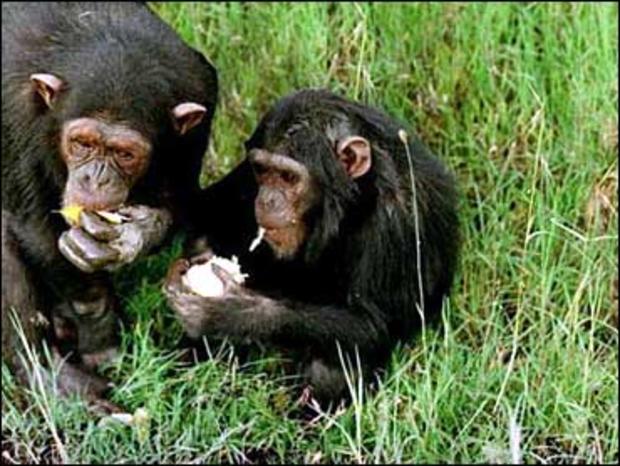Chimps Found to Confront Death in Human-Like Ways
Do chimpanzees grieve in ways that resemble the human mourning process? A couple of new research papers published in the journal Current Biology raise that possibility.
The studies point out striking similarities which support claims that chimps deal with death in human-like ways and may be more aware of death than previously thought.
In one of the studies, researchers found that fellow chimps became increasingly attentive to an elderly female as her health worsened. At times they stroked and groomed the dying animal. After she died, the behavior of one of the older chimps became increasingly lethargic.
"In general, we found several similarities between the chimpanzees' behavior toward the dying female, and their behavior after her death, and some reactions of humans when faced with the demise of an elderly group member or relative, even though chimpanzees do not have religious beliefs or rituals surrounding death," said James Anderson of the University of Stirling. "Whatever the reasons for the chimps' actions, he added, they suggest that chimpanzees have a highly developed awareness of death."
He added that the way in which chimpanzees respond to dead and dying companions, "indicate that their awareness of death is probably more highly developed than is often suggested. It may be related to their sense of self-awareness, shown through phenomena such as self-recognition and empathy towards others."
In the other study, Dora Biro of the University of Oxford and her colleagues followed the behavior of chimpanzee mothers whose babies had died. The grieving mothers continued to carry and groom the lifeless bodies for up to 68 days.
"We observed the deaths of two young infants--both from a flu-like respiratory ailment," Biro said. "In each case, our observations showed a remarkable response by chimpanzee mothers to the death of their infants: they continued to carry the corpses for weeks, even months, following death."
"Chimpanzees are humans' closest evolutionary relatives, and they have already been shown to resemble us in many of their cognitive functions," Biro noted. "They empathize with others, have a sense of fairness, and can cooperate to achieve goals."
The question of how chimps perceive death remains an unanswered question as there is little available data for scientists to work with.
However, Biro suggested that "parallels may exist with physiological and psychological changes experienced by human mothers, in whom the absence of cessation of breastfeeding may cause exaggerated desires to hold their infant (after it has died)."
